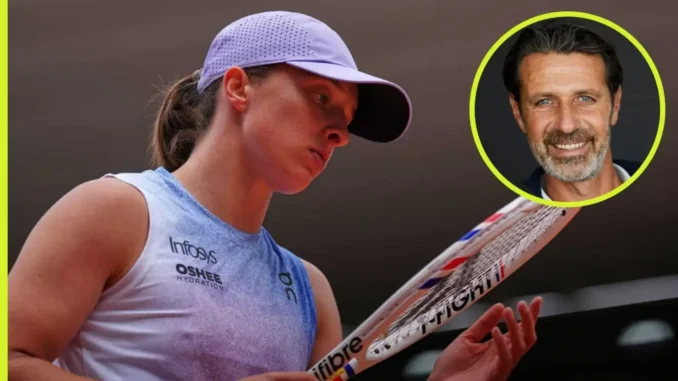
The 2025 French Open has been electrified not only by thrilling matches but also by a heated debate over scheduling, with renowned coach Patrick Mouratoglou at the center of a controversy. The French coach, currently mentoring Naomi Osaka, ignited a firestorm by claiming that Iga Swiatek, the four-time Roland Garros champion, lacks the superstar status of tennis legends like Serena Williams or Maria Sharapova. His remarks, made in response to criticism over the absence of women’s matches in the tournament’s coveted night sessions, have stirred emotions among players and fans, highlighting tensions over gender equity and star power in tennis.
The issue erupted as the French Open, under tournament director Amélie Mauresmo, scheduled men’s matches exclusively for the night sessions on Court Philippe-Chatrier for 11 consecutive days. Stars like Carlos Alcaraz, Novak Djokovic, and Jannik Sinner have headlined these prime-time slots, while Swiatek, Aryna Sabalenka, and Coco Gauff—despite their stellar records—have been relegated to daytime play. Players like Ons Jabeur and Alizé Cornet voiced frustration, with Jabeur calling the scheduling a “shame” and Cornet arguing that the quality of women’s tennis deserves better. Mauresmo defended the decisions, stating, “The message has never been the girls are not worthy of playing at night. It’s never been this,” emphasizing business considerations and fan satisfaction.
Mouratoglou, a veteran coach who guided Serena Williams to 10 Grand Slam titles, weighed in via Instagram, arguing that women’s matches gain more exposure during the day due to broader television audiences. “It’s better for women’s tennis for exposure to be during the day than at night,” he said, noting that daytime slots reach larger viewership on national TV. He also pointed to the structural difference in match lengths—men’s best-of-five sets versus women’s best-of-three—suggesting that a quick 6-1, 6-1 women’s match could leave night-session ticket holders “extremely unhappy.” However, his most provocative claim came when he addressed player popularity: “When they buy a ticket for night, they want to see a superstar. On the women’s side, there is Coco, Sabalenka, but you cannot compare Sabalenka’s audience with Alcaraz or Novak. Most of the people who go to stadiums are not core fans of tennis, they want to come back home and say ‘I saw Djokovic’ or ‘I saw Alcaraz’, if they come back and say ‘I saw Swiatek’, it’s not the same.”
The comment drew sharp criticism, particularly for singling out Swiatek, who is chasing a historic fourth consecutive French Open title. “She’s not a superstar like Serena when she was playing or Sharapova when she was playing,” Mouratoglou added, contrasting Swiatek’s achievements with the global fame of past icons. Swiatek, unfazed, declined to fuel the controversy, stating, “I understand, but I’m not making the schedule.” Her focus remained on her semifinal clash with Sabalenka, where she showcased her clay-court dominance with a 6-1, 7-5 win over Elina Svitolina in the quarterfinals. “It was intense, in the second set, it was kind of tight because we were breaking each other,” she said, highlighting her tactical consistency.
Mouratoglou’s remarks also touched on broader tournament dynamics. He defended Mauresmo, saying, “You cannot even think that Amélie Mauresmo would try to do something against women’s tennis. It makes no sense.” He argued that her responsibility is to ensure fan satisfaction and financial success, which favors scheduling “superstars” for night matches. Yet, his comments about Swiatek’s star power rankled fans, especially given her 95% win rate at Roland Garros and her status as a fan favorite. The debate has reignited discussions about how tournaments define “star power” and whether women’s tennis is undervalued in prime-time slots.
As Swiatek continues her quest for another title, the controversy underscores the challenges of balancing commercial interests with fairness. Mouratoglou’s bold stance has sparked a broader conversation about the visibility of women’s tennis, leaving fans and players alike questioning how the sport can better showcase its brightest talents, regardless of gender.
Leave a Reply